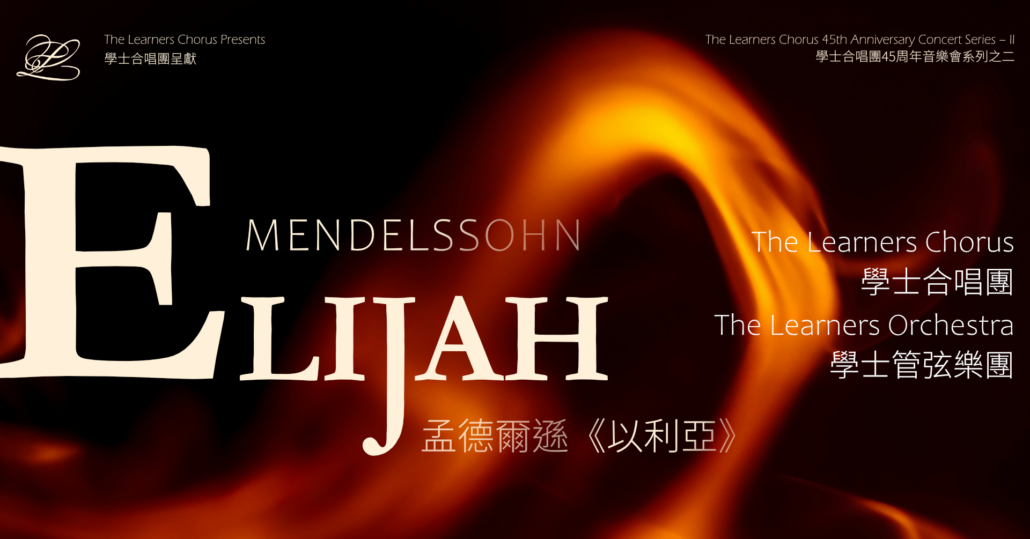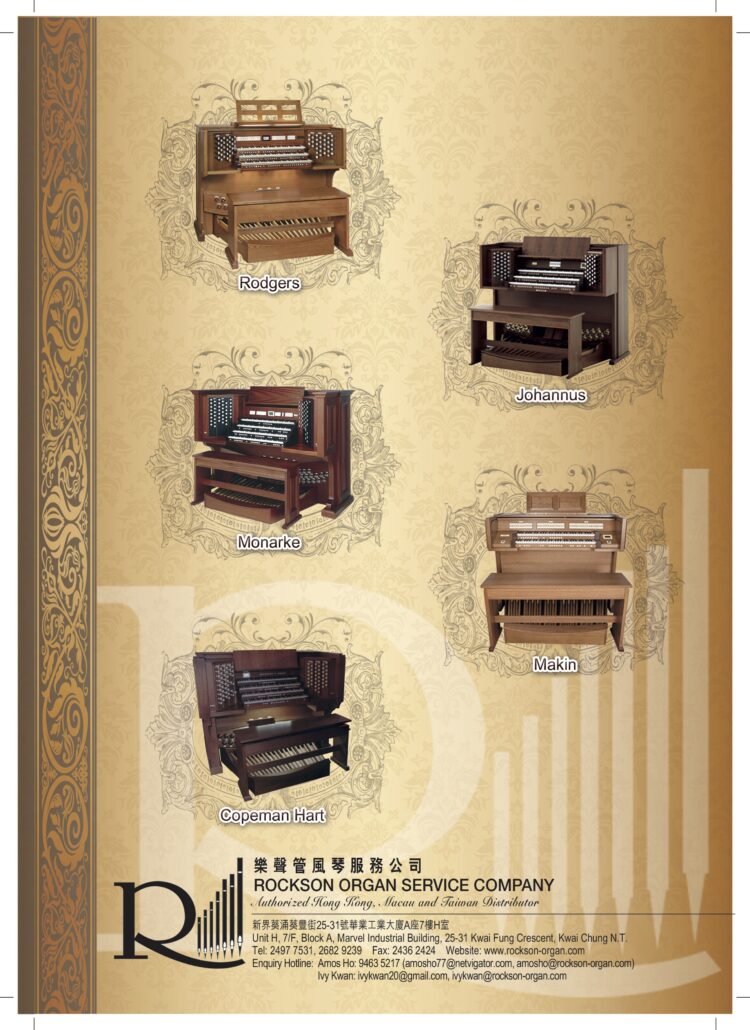Programme
Felix Mendelssohn
Elijah, Op.70
Approximate timings
Part I (70 minutes)
– INTERMISSION –
Part II (70 minutes)
Apollo Wong, music director & conductor
Candice Chung, soprano (Angel, Widow)
Ashley Chui, mezzo-soprano (Angel, Queen Jezebel)
Justin Li, tenor (King Ahab, Obadiah)
Michael Lam, baritone (Elijah)
The Learners Chorus
The Learners Orchestra
Performers’ Biographies
Apollo Wong, music director & conductor
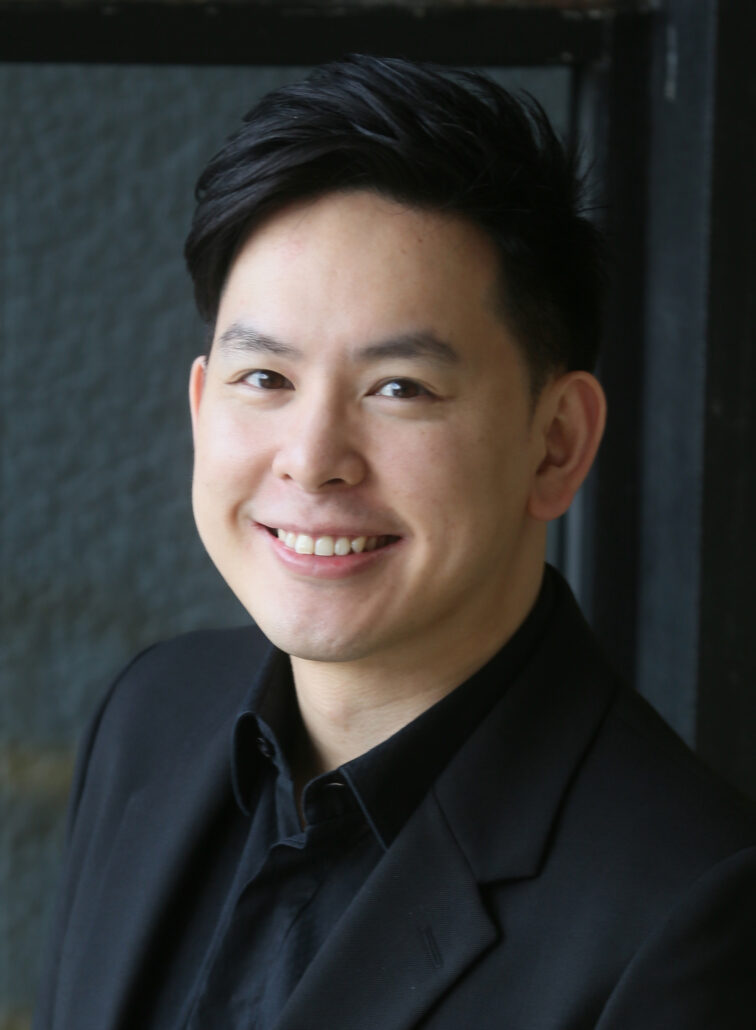
A native of Hong Kong, Apollo Wong is a conductor, operatic bass and educator. Educated in the United States and Germany, he studied voice with Vladimir Chernov, Juliana Gondek and Sami Kustaloglu. He was the winner of Palm Springs Opera Guild Vocal competition and the Pasadena Opera Guild Vocal Scholarship. In 2019, Wong has won first place at the Hong Kong Choral Conducting Competition and the Asia Pacific Youth Choir Award.
Wong has sung major operatic and musical roles including Figaro (Le Nozze di Figaro), Don Alfonso (Così fan tutte), Sarastro (Die Zauberflöte), Bottom (A Midsummer Night’s Dream), Frère Laurent (Roméo et Juliette), Colline (La Bohème), Simone (Gianni Schicchi), Geppetto (Pinocchio) and Javert (Les Misérables), among others. Amongst his concert and oratorio repertoire, he has notably both sung the bass solos and conducted Brahms’ Ein Deutsches Requiem, Faurè’s Requiem, Handel’s Messiah, Mahler’s Symphony No. 8 “Symphony of a Thousand”, Mozart’s Requiem, and Verdi’s Messa da Requiem. He also performed in world premiere operas by Chan Hing Yan: Lu Xun (Heart of Coral), Moonlight (Ghost Love) and Kang You Wei (Datong); and Caterpillar and Duchess (Alice in Wonderland) by Valtinoni. He also sung Schubert’s Winterreise (with Hong Kong City Contemporary Dance Company).
Being an active conductor, Wong is currently Chorus Master of Hong Kong Philharmonic Chorus, Music Director of The Learners Chorus and The Learners Orchestra, and conductor of Hong Kong Children’s Choir and St. Paul’s Co-educational College senior choirs. Being recognized as an inspiring chorus and orchestral builder, from community to professional ensembles, he has introduced a broad variety of choral and orchestral music to the public: from Magnificat by Bach and Rutter, Brahms’ Ein Deutsches Requiem and Schicksalslied, Gounod’s St. Cecilia Mass, Lauridsen’s Lux Aeterna, Lully’s Te Deum, Mendelssohn’s Lobgesang, Mozart’s Great Mass in C Minor and Requiem, Rossini’s Messa di Gloria and Stabat Mater, Tallis’ Spem in Alium, Verdi’s Messa da Requiem and Quattro pezzi sacri; to Mahler’s Symphony No. 2 “Resurrection”, Martin’s Mass for Double Choir, Orff’s Carmina Burana, Pärt’s Credo, Poulenc’s Gloria, Prauliņš Missa Rigensis, Prokofiev’s Alexander Nevsky, Rachmaninoff’s The Bells, and Stravinsky’s Symphony of Psalms.
He has been the chorus master for conductors such as David Atherton, Lorin Maazel, Helmuth Rilling, Tan Dun and Jaap van Zweden; and has been assistant conductor in operas Aida, Don Giovanni, Gianni Schicchi, L’elisir d’more, La Bohème and Turandot.
Samuel Huang, concertmaster
Samuel Huang was born and raised in Hong Kong, where he studied violin and viola with Ray Tsoi at Hong Kong Baptist University, and with Ivan Chan at Hong Kong Academy for Performing Arts. He continued his studies in the United States under the tutelage of Benny Kim, Miami String Quartet, Cathy Meng Robinson, and Amy Lee at Kent State University and University of Missouri-Kansas City, where he obtained his master and doctorate degrees in violin performance respectively. Samuel has been exploring different schools of string pedagogy by participating in string teacher workshops and conferences at University of Illinois Urbana-Champaign, Ohio State University, and the University of Wisconsin Milwaukee.
Winner of the Hong Kong Baptist University Concerto competition and UMKC Concerto/Aria competition, Samuel has appeared as a soloist and concertmaster with orchestras including Pro Arte Orchestra of Hong Kong, Shenzhen Arts School Orchestra, the Kharkov Philharmonic Orchestra (Ukraine), Heartland Chamber Orchestra, Texas Festival Orchestra, and Miami Festival Opera Orchestra.
Apart from solo and orchestral performing, Samuel had served as the violinist of the NewEar Contemporary Chamber Ensemble in Kansas City for four years, and worked closely with contemporary classical composers such as Jennifer Higdon, Chen Yi, and Zhou Long. He has collaborated with world-class artists in chamber music, such as Ida Kavafian, Yekwon Sunwoo, and members from Miami String Quartet and St. Petersburg String Quartet.
As an educator, Samuel has given masterclasses in various universities and festivals, including Western Illinois University, Fort Hays State University, and International Fringe Music Festival. Currently, he is serving as the resident conductor at Hong Kong Baptist University, working with the HKBU symphony orchestra and Collegium Musicum Hong Kong.
Candice Chung, soprano
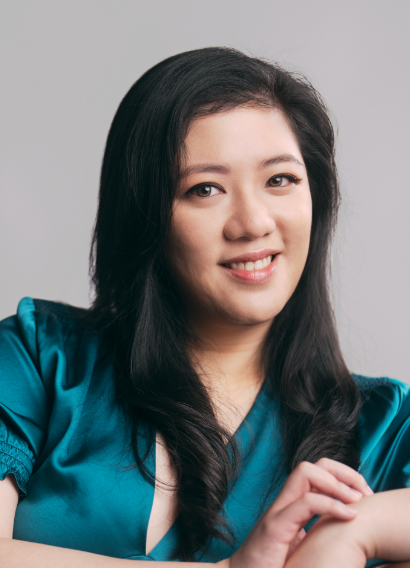
Soprano Candice Chung studied at Manhattan School of Music under Metropolitan Opera’s Mark Oswald and renowned American soprano Ashley Putnam. She also obtained a Masters of Music degree at Eastman School of Music, where she trained with American mezzo-soprano Katherine Ciesinski.
Candice appeared as Laetitia in The Old Maid and the Thief and Emily in Our Town with the Eastman Opera Theatre while in the US. She also played Dew Fairy in Hansel and Gretel and Rosalinda in Die Fledermaus with the Jorgensen Center for the Performing Arts. She made her Italian debut as Countess in Le Nozze di Figaro in 2017.
Upon her return to Hong Kong, Candice made her recital debut under the presentation of the Leisure and Cultural Services Department (LCSD)’s “Our Music Talents” Series in 2017. Her concert performances included Dvorak’s Te Deum, Beethoven’s Mass in C, Bach’s Magnificat in D, Carl Orff’s Carmina Burana, and Handel’s Messiah, to name a few. She performs regularly with Opera Hong Kong, with recent roles including Norina in Don Pasquale, Micaela in Carmen and Fiordiligi in Cosi fan tutte. She is also one of the featured singers in the “Under the Lion Rock” concert tour series with Opera Hong Kong, performing in more than 10 cities in Mainland China since 2023.
With Bel Canto Singers, an innovative Hong Kong-based collective which draws on the city’s multicultural identity to amplify local voices, Candice has created the role of Swallow in the original musical The Happy Prince & The Other Wise Man in 2018, and the character Liu in My Beloved, an all-Puccini jukebox opera in 2021. The Happy Prince was then produced into an online video series, which was shown in theatres across Mainland China. She most recently played the role of Hanna in The Merry Party, another jukebox opera weaving together Franz Lehár’s The Merry Widow and Johann Strauss II’s Die Fledermaus, with an original Cantonese script.
In December 2022, Candice had the honour to be selected as a soloist to perform at the Asia Cultural Co-operation Forum, showcasing Hong Kong talents in front of an audience comprising entirely of dignitaries from various ministries of culture in Asia-Pacific.
Candice premiered the role of Ah Sei in Kungfood in 2023, the chamber opera being one of the first classical western-style operas written in Cantonese, composed by Chan Hing-yan and directed by renowned opera director Tomo Sugao. In June 2023, she was invited to sing in the world premiere of Tan Dun’s Requiem for Nature in Holland Festival with the Royal Concertgebouw orchestra in Amsterdam, where she sang the role of the Deer of Nine Colours to critical acclaim. She reprised the role of the Deer of Nine Colours in Tan Dun’s WE Festival: Opera and Dance Theatre in Hong Kong in December 2023, singing this time in Cantonese. In November 2023 and January 2024, she was also the soprano soloist of Tan Dun’s Buddha Passion respectively in Rome with Accademia Nazionale di Santa Cecilia Orchestra and in Macau with Lanzhou Symphony Orchestra.
Candice is also featured in the music video online series “Art Songs 101” which will be launched on LCSD’s Edutainment Channel in August 2024.
Ashley Chui, mezzo-soprano

Ashley Chui is a Mezzo-soprano based in Hong Kong. She has portrayed opera roles including Carmen and Mercedes in Bizet’s Carmen, Dorabella in Mozart’s Cosi Fan Tutte, Ines in Versi’s Il Trovatore, Veronique in Bizet’s Le Docteur Miracle, Third Lady in Mozart’s Magic Flute, Dog/Franktik/Woodpecker in Janacek’s The Cunning Little Vixen and Angelique in Delibes’s Le Roi L’a Dit. Besides opera performances, Chui has collaborated as a soloist with the International Chamber Orchestra of America, Oberlin in Italy, Opera Hong Kong, Hong Kong Generation Next Arts, Hong Kong Festival Orchestra, and more. She is a recipient of the 2nd prize in the 2013 Yokohama International Music Competition and the special prize in the 2022 Ise-Shima International Singing Competition. She is also one of the winners in the Hong Kong division of the 14th Chinese Golden Bell Award for Music. In the past season, Chui was invited to perform in arts festivals including Hong Kong Arts Festival, French May, and Obidos Opera Festival in Portugal. She is recently on tour with Opera Hong Kong performing in “Under the Lion Rock” touring concerts in Mainland China cities.
Ashley earned her bachelor’s degree from Manhattan School of Music and her master’s degree from Columbia University in New York City. Ashley Chui was a member of Opera Hong Kong’s Young Artist Program.
Justin Li, tenor
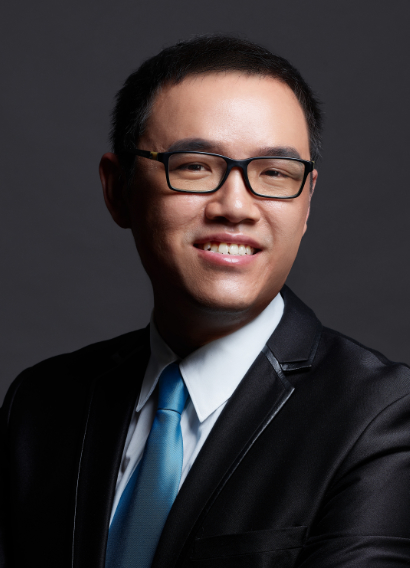
Justin Li began his vocal training in Hong Kong with tenor David Quah and continued later in London under the tutelage of mezzo soprano Catrin Johnsson. During his study in London, he appeared as the tenor soloist in concerts such as Mozart’s Mass in C minor and Bach’s Magnificat. After returning to Hong Kong in 2007, he has won the Miss Barbara Fei Vocal Scholarship Open Class, the Oratorio and Art Song category at the 61st Hong Kong Schools Music Festival, and the Art Song category at the 4th Hong Kong Youth Singing Festival. In 2008, he obtained the Licentiate Diploma in voice with distinction from the Trinity College of London.
Li has since then worked extensively as guest soloist with various local choirs and organizations, such as Hong Kong Voices, SingFest, Die Konzertisten and Hong Kong Youth Choir. His repertoire includes Handel’s Messiah, Saint-Saëns’ Oratorio de Noël, Mozart’s Requiem in D minor K.626, Beethoven’s Symphony No.9, “Choral”, Britten’s Cantata Saint Nicolas, Puccini’s Messa di Gloria and J.S. Bach’s St. John Passion, in which he made his debut as Evangelist in 2014. He has worked with City Chamber Orchestra of Hong Kong singing the role of the Bear in Howard Blake’s The Bear from 2017-2019 and 2021, conducted by Colin Touchin. He has also worked with various conductors such as Wolfgang Katschner in Monteverdi’s Vespro della Beata Vergine, Prof. William Weinert in J.S. Bach’s Cantata BWV 21, Prof. John Butt in J.S. Bach’s St John Passion and Gábor Hollerung in The Chinese University of Hong Kong Chorus’ 50th Anniversary Concert, singing Rossini’s Petite messe solennelle. In March this year, Li has worked with The Learners Chorus and Macau Orchestra in Macau singing Bach’s Easter Oratorio under the baton of Apollo Wong.
Li is also a proud member of the premier chamber choir NOĒMA.
Michael Lam, baritone
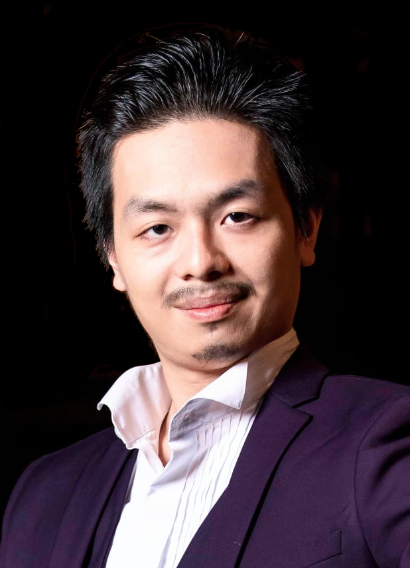
Praised for a voice of “deliciously deep and rich,” (Birmingham Post), Hong Kong baritone Michael Chun Ting Lam is a wide-ranging opera and concert soloist who has performed in Hong Kong, the United Kingdom, Italy, France, Germany, Austria, Hungary, Vietnam, Singapore, the Philippines, as well as other countries. Born and raised in Hong Kong, Michael received his Bachelor of Music from The Hong Kong Academy for Performing Arts before he pursued a Master of Music in Vocal Performance at Royal Birmingham Conservatoire. He went to the Liszt Ferenc Academy of Music in Hungary for further postgraduate training on the Joseph Weingarten Scholarship, completing the course in 2018. Due to his outstanding work, he received a number of scholarships, including Opera Hong Kong K Wah International Vocal Scholarship, the Foundation for the Arts and Music in Asia Limited (FAMA) Vocal Scholarships, the Welsh Male Choir Scholarship, the Bernard van Zuiden Music Fund, The Hong Kong Children’s Choir Chan Ho Choi Memorial Scholarship, Michael Rippon Memorial Scholarship, Mr Ng Fung Chow Memorial Scholarships and Birmingham Conservatoire Scholarship Fund, to name a few. Michael was a first-prize winner of numerous international singing competitions, including the Hong Kong International Music Festival, Grand Prize Virtuoso, and the Ashleyan Opera Prize, to name a few. In 2017, he was selected as the year’s most exceptional opera student and received the St Clare Barfield Memorial Bowl for Operatic Distinction by the Royal Birmingham Conservatoire. He has been given the Gil Rodriguez Scholarship Award from Opéra de Baugé for his outstanding contribution to the 2019 Operatic Season.
Passionate about opera, Michael has sung more than 40 operatic roles and performed for opera companies, orchestras and festivals in Asia and Europe, including Opera Hong Kong, Musica Viva, Hong Kong Arts Festival, Hong Kong Grand Opera, Silent Opera, Winslow Hall Opera, OperaUpClose, Grimeborn Opera Festival, Passaggio Oper, Opéra de Baugé, Vietnam National Opera & Ballet, Orchestra of the Music Makers Singapore, Lyric Opera of the Philippines, and more. He has sung the title roles of Macbeth, Don Pasquale, Giulio Cesare and Il barbiere di Siviglia, Tonio(Pagliacci), Alfio(Cavalleria Rusticana), Count Almaviva(Le Nozze di Figaro), Guglielmo & Don Alfonso(Così Fan Tutte), Il Commendatore (Don Giovanni), Marcello & Colline(La Bohème), Timur(Turandot), Bonze(Madama Butterfly), Marco(Gianni Schicchi), Escamillo(Carmen), The Four Villains(Les Contes d’Hoffmann), Forester(The Cunning Little Vixen), Bottom(A Midsummer Night’s Dream), Belcore(L’elisir d’amore), Lord Guglielmo Cecil(Maria Stuarda), Lord Rochefort(Anna Bolena), Don Magnifico(La Cenerentola), Death(Sāvitri), Le Fauteuil(L’enfant et les sortilèges), Donner(Das Rheingold), Silvano(Un Ballo in Maschera), Count Ceprano(Rigoletto), Baron Douphol(La Traviata), Dr Blind(Die Fledermaus), Ben Upthegrove(The Telephone) and David(The hand of Bridge), among others.
A fan and advocate of contemporary music, Michael has created several roles in the world premieres of operas, including the Young Man 3 in Huang Ruo’s Dr. Sun Yat-Sen(2011) for Opera Hong Kong, Sakyamuni, the Buddha in Anna Vienna Ho’s Buddha and the Monkey King(2020) and The Monk of the River(2021), and Xuanzang in The Monster of Gao Village(2023) for Tête à Tête: The Opera Festival, The Lead Picker in Daniel Blanco Albert’s Autohoodening: The Rise of Captain Swing(2021) for Infinite Opera and Post Workers Theatre, Confucius in Gustav Ka Lok Mak’s The Legend of Confucius(2022), and Ah Q in Hing-yan Chan’s Kungfood(2023) for Hong Kong Leisure and Cultural Services Department for Global Symphony Orchestra; and main roles in pasticcios including Don Basilio in Fortunes of Figaro(2017) for Opera Novella, Argante in Armida(2018) for Zeneakadémia and Eisenstein in Merry Party(2022) for Bel Canto Singers. He has also sung the role of Mr. Crow in the Asian premiere of Pierangelo Valtinoni’s The Snow Queen for Yip’s Children’s Choir in 2023.
On the concert stage, Michael performed as the baritone and bass soloist for many well-known organizations, singing the masterpieces of various composers, including Haydn’s Nelson Mass, J.S. Bach’s Magnificat in D Major, Felix Mendelssohn’s Die erste Walpurgisnacht, Handel’s Messiah, Faure’s Requiem, Brahms’s Ein deutsches Requiem, and Beethoven’s Symphony No. 9, etc. He has performed as the baritone soloist in Opera Galas for Red Earth Opera, Midland Opera, Oxford Opera Society, Józsa Judit Galéria, and Holy Trinity Church Coventry. He has also been giving solo recitals regularly, including one at Citibank Plaza as part of the Musica del Cuore recital series 2015, one at St Andrew’s Church Rugby as part of the Rugby Festival of Culture 2019 and one at Hong Kong City Hall as part of Hong Kong Leisure and Cultural Services Department’s “Our Music Talents” series 2022. He has sung the role of Konfuzius in Gustav Ka Lok Mak’s Die Legende von Konfuzius(excerpts) with the Budapest MÁV Symphony Orchestra in the Golden Hall of the Musikverein in Vienna under the baton of Maestro Mak in 2022; as a guest soloist in the CityU Choir: “Bravo! Brava! Bravi!” concert, as part of the CityU Arts Festival 2022/23. In 2023, he was invited to be the guest soloist in the Wong Tai Sin Children’s Choir 50th Anniversary Concert. Recently, he has been invited to perform a joint recital at the Hong Kong International Institute of Music, as part of its Community Circle Theatre Outdoor Concert series.
An enthusiastic educator, Michael has not only been teaching singing for more than ten years but has also worked for various music centres and many local schools as a vocal instructor and choir conductor. He worked as an assistant vocal coach in K. Wah Opera Hong Kong summer school programme in 2017 and as a language coach for Vopera in their award-winning production of Ravel’s L’enfant et les sortilèges in 2010. He has been the adjudicator of the “Festival of Instrumental and Vocal Arts” International Online Music Competition, Russia(2021&2022), International Competition for Musicians “Virtuosos”, Russia(2022), and Hong Kong International Music Cultural Festival Singing Competition(2023). In 2024, he served as an artistic director and producer for the Hong Kong International Institute of Music for its opera production of Menotti’s Amahl and the Night Visitors, in which he worked in multiple positions including the conductor, stage director, chorus master, singing teacher and screenwriter. Besides working as a choir conductor for a few primary and secondary schools, he is also a choir tutor at Yip’s Children’s Choir, a vocal instructor at International Christian Quality Music Secondary Primary School and a lecturer and singing teacher at the Hong Kong International Institute of Music.
The Learners Chorus
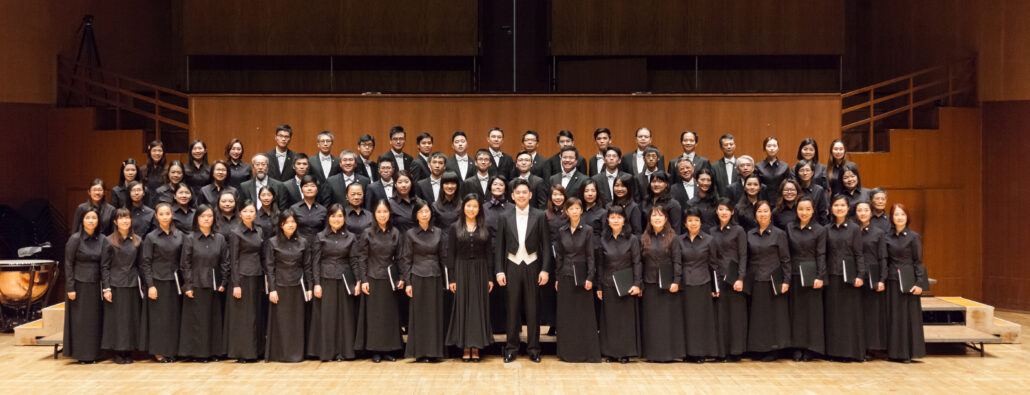
Music Director & Conductor: Apollo Wong
Assistant Conductor: Jason Liu
Pianist: Alexander Wong
The Learners Chorus was founded in 1979 by former members of the Hong Kong University Students’ Union Choir. Its repertoire includes a wide spectrum of choral works, and commissioned works by distinguished Hong Kong composers, including Dr. Chan Hing Yan, Dr. Victor Chan, Dr. Daniel Law, Mr. Law Wing Fai, Dr. Phoebus Lee, Mr. Jason Liu, Mr. Michael Mak and Dr. Richard Tsang. Major choral works presented and performed in recent years include Bach’s Magnificat, Bernstein’s Chichester Psalms, Brahms’ Ein Deutsches Requiem and Schicksalslied, Faure’s Requiem, Gounod’s St. Cecilia Mass, Lully’s Te Deum, Mahler’s Symphony No. 2 “Resurrection” and Symphony No. 8 “Symphony of a Thousand”, Martin’s Mass for Double Choir, Mendelssohn’s Lobgesang, Mozart’s Great Mass in C Minor and Requiem, Orff’s Carmina Burana, Pärt’s Credo, Poulenc’s Gloria, Prauliņš’ Missa Rigensis, Rachmaninoff’s The Bells, Rossini’s Messa di Gloria, Petite Messe Solennelle and Stabat Mater, Rutter’s Mass of the Children, Stravinsky’s Symphony of Psalms, Tallis’ Spem in Alium and Verdi’s Messa da Requiem and Quattro pezzi sacri.
Apart from hosting large-scale concerts with its official orchestral partner, The Learners Orchestra, the Chorus has also given guest performances both locally and abroad. In 2013 and 2014, the Chorus performed Britten’s War Requiem with the Hong Kong Philharmonic Orchestra and its Chorus under the baton of the late Maestro Lorin Maazel, and to celebrate “Hong Kong Cultural Centre – Celebrating 25 Years” respectively. In 2015, Learners performed at “Macao Soul” with the Macao Orchestra and the Macao Perosi Choir at the 26th Macao Arts Festival. In July 2016, in collaboration with the Hong Kong Economic and Trade Office, London, Learners gave its London debut at St John’s Smith Square, performing a wide range of choral works in nine different languages, of different styles and from across different eras. In August 2016, alongside the Arnold Schoenberg Choir, the Vienna Boys’ Choir and the Hong Kong Treble Choir, Learners performed Mahler’s Symphony No. 8 “Symphony of a Thousand” at the Hong Kong-Vienna Music Festival. In May 2017, Learners performed at “紫荊花開”, a joint choral concert with the Shenzhen University Caisangzi Chorus (深圳大學采桑子合唱團), at the Shenzhen x Hong Kong Art & Culture Exchange Festival (深港青年文化交流藝術季). In 2018, Learners gave three visits to Macau to participate in the recording session of Te Deum by Macanese composer Fr. Áureo in May, and perform at “Heroes: A Video Game Symphony” and “National Geographic: Symphony for Our World” with the Macao Orchestra under the baton of Maestra Jessica Gethin, in June and November respectively. In April 2019, alongside the Shenzhen Symphony Orchestra, Learners performed at “Arias between Western & Eastern”, the closing concert of the 2019 Shenzhen Belt & Road International Music Festival. In August 2019, in collaboration with the Dream Orchestra of Los Angeles, Learners gave its North American debut, performing both at the Los Angeles International Choir Festival and, alongside the Opera Chorus of Los Angeles, “Verdi Requiem” at the Cathedral of Our Lady of the Angels. In 2023, Learners joined the Hong Kong Philharmonic Orchestra and Chorus in two performances of Brahms’ Ein Deutsches Requiem. This year, the choir was invited by Macao Orchestra to perform Bach’s Easter Oratorio.
Learners is devoted to promoting music among young people. Students are often invited to sing with the Chorus or play in The Learners Orchestra alongside professional musicians. Young choir members interested in choral conducting have been offered the chance to conduct the Chorus in various concerts. Young musicians also give guest performances in its concerts. “Learners Learning” Concerts have been held to improve choir members’ vocal skills through ensemble or solo singing. During school breaks, Learners’ student members are often sponsored by friends of Learners to participate in vocal workshops and master classes given by its Music Director. Student Ticket Sponsorship Programme has served its mission of extending music appreciation opportunities among Hong Kong’s youth. Since 2006, almost 8,300 students, many first-timers, have received tickets to its concerts, all sponsored by benevolent friends of Learners.
Active in community and charitable work, Learners has also given performances at elderly homes, disabled homes and sheltered workshops. Learners has also presented outreach programmes at community centres in London, featuring both choral singing and interactive games with the audience, both of which were positively received. Net ticket proceeds from fundraising concerts have been donated to charitable projects of the Hong Kong Christian Council, including the “Rebuilding Village Clinics Project”, “Water Cellars for Homes Project”, “Rebuilding Collapsing Schools Project”, “Senior High School Sponsorship Project”, “School Library Books Project” in China, “School Building Project in Myanmar”, “Village Development in Myanmar Project”, “Feeding Program in Myanmar / Cambodia” and “COVID-19 Relief Projects”. Learners has also raised funds for A Drop of Life Limited to install water cellars in Gansu, and participated in their “Walk for Water” project. The Chorus has also co-presented earthquake relief concerts in the past, including, most recently, “The Future of Nepal: Fundraising Concert for 4.25 Earthquake Victims” in May 2015. In June 2015, Learners performed at “Michaelmas Fair 2015 Concert – Hope and Dream”, a fundraising concert organized by St John’s Cathedral of Hong Kong.
By cultivating youth education through the aforesaid means, Learners strives to abide by its name in a fuller sense.
The Learners Orchestra

In April 2006, a group of caring orchestral players performed in “A Tribute to Mozart – Requiem and other works”, a charity concert presented by The Learners Chorus (the “Chorus”) to commemorate the 250th birthday of Mozart. In September 2007, the Friends of Learners Orchestra (the “FLO”) was officially founded and made its debut at the Chorus’ annual concert at the Hong Kong Cultural Centre, featuring Prokofiev’s Alexander Nevsky cantata. Since then, FLO has performed with the Chorus in its large-scale concerts, namely, “Magnificat through the Ages”, “Celebrating Thirty Years of Harmony: Gustav Mahler Symphony No. 8 Symphony of a Thousand”, “Rossini Messa di Gloria & Brahms Schicksalslied”, and “Giuseppe Verdi: Messa da Requiem”. At its performance in “Celebrating Great Masters for the Voice” in September 2013, FLO was renamed The Learners Orchestra (“TLO”), making it the official orchestral partner of the Chorus. As part of the Chorus’ 35th Anniversary Concert Series, TLO held its inaugural concert with the Chorus in May 2014, performing “Mahler Symphony No. 2 Resurrection”, followed by “Brahms Ein Deutsches Requiem” in August 2014. Subsequent to that, TLO performed in the 2015 SliderAsia Music Festival’s “SliderAsia Open Winners Feature & Learners Orchestra Concert”, “La Musica Sacra Italiana” in July 2015, “Songs of Praise – in Voces Multi” in January 2016, featuring Lully’s Te Deum, “Mozart Great Mass in C minor” in September 2016, and “Lux Aeterna” in January 2017.
2017 also saw the 10th anniversary of the Learners Orchestra. “10 May x 10 Years: A French Celebration” concert was held in May 2017, featuring Saint-Saëns’ Symphony No. 3 in C minor “Organ”. This was followed by “Lights of Belief and Praise” in September 2017, “A Bicentennial Celebration: Gounod St Cecilia Mass” in September 2018, “UC Conductors Through the Ages” in January 2019, featuring Fauré’s Requiem, “Tchaikovsky Symphony No. 4” in June 2019, and “Carmina Burana” in November 2019.
Members of TLO are recruited from various local schools and universities, as well as from community and professional orchestras. All members strongly dedicate themselves to supporting charitable performances of the Chorus without receiving any honorarium. Their selfless and benevolent effort, and consistently high performance standards have been much appreciated by the Chorus, the audience, and all beneficiaries. TLO also aims to play a vital role in promoting music education – specifically, by providing opportunities for music students to work alongside their teachers, amateurs alongside professional musicians; and in expanding their concert repertoire beyond standard orchestral music.
Programme Notes
Mendelssohn: Elijah
Felix Mendelssohn (3 Feb 1809 – 4 Nov 1847), a German composer, pianist, organist and conductor, was a remarkable child prodigy. Born in Hamburg as the grandson of influential Jewish philosopher Moses Mendelssohn, his musical talent was recognized early. His parents, however, chose not to capitalise on it, thanks partly to the Mendelssohn family’s wealth from his father Abraham and uncle Joseph’s successful banking business which helped avoid any need to flaunt the young Felix as a wunderkind.
By 1825, at the age of 16, Mendelssohn already wrote a dozen of string symphonies, his first symphony for full orchestra, some piano quartets, and a collection of other works, many of which were performed at home concerts with a private orchestra. This was also the year when his grandmother Bella Salomon gave him a copy of the manuscript of an oratorio that was at the time largely forgotten – Johann Sebastian Bach’s St. Matthew Passion BWV 244.
Four years later, with the backing of his composition teacher Carl Friedrich Zelter, Mendelssohn arranged and conducted a performance of Bach’s masterpiece, an event that was pivotal in the revival of Bach’s music in Germany and earned Mendelssohn widespread acclaim.
Despite hopes of succeeding Zelter as head of the Berliner Singakademie after he died, Mendelssohn was passed over in favour of a competitor, leading him to eventually accept the role as musical director of Düsseldorf in 1833. It was here that he composed St. Paul (Paulus), Op.36, the first of his two great oratorios.
The enthusiastic reception received at the premiere of St. Paul at the 18th Lower Rhenish Music Festival (1836) may have encouraged Mendelssohn to compose another oratorio. This new oratorio eventually took ten years to come to fruition and became Elijah (Elias), Op.70, the oratorio we will hear tonight.
Work on the piece was hardly smooth sailing. After initially deciding on Elijah as the subject with the help and suggestion of his friend Karl Klingemann, work came to a halt when Klingemann had neither the time nor the energy to come up with a full libretto.
A year later in 1838, Mendelssohn turned to another friend, pastor Julius Schubring who co-wrote the libretto for St. Paul, for assistance on the text. A lively exchange of letters ensued, but eventually work again fizzled out as the composer and the pastor disagreed on, among other things, the role of dramatic elements in oratorios. Schubring preferred a more devotional tone, which clashed with Mendelssohn’s want for drama, resulting in Schubring ultimately asking the composer to “look for help elsewhere”.
The idea for the oratorio laid at the back of his mind for the subsequent six years, until Mendelssohn was given the perfect excuse to dive back in. Such occasion came in 1845 in the form of a commission for an oratorio from the Birmingham Triennial Music Festival, where St. Paul and his second Piano Concerto, Op.40 was performed with great success eight years prior. The festival asked for a new oratorio for their 1846 festival, to be held in August.
Despite the lack of a complete libretto, Mendelssohn nonetheless took up the challenge knowing that he merely had about a year to complete the work. As differences with Schubring remained insurmountable, the composer ended up having to compile the bulk of the text himself.
The Birmingham festival, of course, was looking for something in English for their audience, so Mendelssohn enlisted yet another friend, William Bartholomew, for a singable English translation of the libretto. Meanwhile, composition continued in a breakneck pace. By May 1846, the whole of Part I and several numbers of Part II were already completed. With Bartholomew further helping with creating the English choral scores for the premiere, Elijah was completed on 11 Aug 1846 with just a week to spare before the composer travelled to London to rehearse with the soloists and orchestra for the premiere.
The premiere at Birmingham was a resounding success, with the composer himself commenting that “never has a piece of mine come off so splendidly at its first performance, and been received so enthusiastically by the musicians and listeners, as has this oratorio”. Subsequent performances in London and Birmingham, conducted by the composer, cemented Elijah’s place in the choral repertoire.
Interest in Elijah spread to continental Europe, with a premiere of the German version planned for 14 November 1847 in Vienna. That was, sadly, not meant to be, as Mendelssohn succumbed to a series of strokes on 4 November 1847 and never lived to hear this performance.
Synopsis
Elijah is set in Old Testament times, at a point when the Kingdom of Israel has turned away from God and taken to worshipping Baal, a Canaanite deity associated with fertility. The oratorio describes the prophet Elijah’s efforts in restoring the worship of the Israelites’ true God, Yahweh, culminating in his ultimate triumph and ascension into heaven.
Part One
Instead of going straight into a formal overture, Part One begins with Elijah’s announcement that God will punish the Israelites with an enduring drought. The overture that follows depicts the anxiety and suffering of the people, eventually bursting in to a cry for help (No.1), despair and pleading (No.2). Obadiah, chief steward of the Israelite King’s household, tells the people to forsake their false idols (No.3) and wholeheartedly seek God’s mercy (No.4). The Israelites angrily reply that God is jealous and vengeful, whose wrath will pursue them until they are destroyed (No.5).
Cutting to a new scene, an angel sends Elijah out into the desert to hide by Cherith’s brook, where he will have water and will be fed by ravens (No.6), and that the angels will watch and protect him (No.7). From there, the angel again sends him to Zarephath, promising that a widow will sustain him. The duet that follows (No.8) is in essence an operatic scene depicting the widow’s pleading to Elijah to save her dead son and how Elijah, through prayer, brings him back to life. The chorus “Blessed are the men who fear him” (No.9) highlights the moral of the story.
Three years then pass, and Elijah returns to confront the Israelites and their King Ahab (No.10), accusing them of forsaking God’s commands by worshipping Baal. He challenges them to prepare a bullock for sacrifice, then call on their god to light the sacrificial fire. The prophets of Baal call on their god thrice without success – first in a noisy dance with shadows of doubt creeping in towards the end; then an attempt to awaken Baal after Elijah teases that perhaps he is asleep; and finally as Elijah mocks that they will not be heard, an agitated and desperate chorus of “hear and answer” (Nos.11-13).
Elijah’s turn followed, where in a noble prayer he calls upon Jehovah to reveal himself and show that he is God (No.14). A four-part chorale “Cast thy burden upon the Lord” follows, written for soloists but will be sung tonight by the chorus, a moment of affirmation for both Elijah and the people of their faith in God’s power and mercy (No.15). With further invocation from Elijah, fire miraculously descends from heaven to consume the offering. After a quiet but determined acknowledgement that “The Lord is God” emerges from the chaos, Elijah turns fierce and orders the prophets of Baal to be taken and slain (No.16). The people oblige, and Elijah sings an excited and intense song of praise (No.17), followed by a sombre mezzo-soprano arioso “Woe unto them who forsake Him” (No.18).
Agreeing with Obadiah’s plead that it is now time for the drought to end, Elijah and the people pray to God to open the heavens. A youth is sent to go up into the mountain and look out to the sea. Twice the youth reports nothing, until with Elijah’s increasingly animated prayer, the youth finally sees cloud forming and a storm rushes in (No.19). Part One ends with the jubilant chorus “Thanks be to God, he laveth the thirsty land” (No.20).
Part Two
Part Two opens with a soprano solo “Hear ye, Israel! Hear what the Lord speaketh!” (No.21), which culminates in the comforting words “Be not afraid”. The chorus picks up this text and transform it into a reassuring anthem (No.22). However, the Israelites have once again reverted to worshipping Baal, and the furious Elijah prophesies against Israel. Queen Jezebel, enraged by his curse, incites her people to capture and kill him, just as what he had done to the prophets of Baal (No.23). The gathered Israelites, now inflamed by their queen’s words, plan to seize and kill Elijah (No.24).
Obadiah, seeing the imminent threat to Elijah’s life, advises him to flee (No.25), and Elijah again retreats into the desert. Distraught by his failure and feeling abandoned, he asks God to end his life – “It is enough!” (No.26). Exhausted, Elijah falls asleep under a juniper tree (No.27), where unbeknownst to him the angels keep watch and guard him (Nos.28, 29). Eventually, an angel wakes Elijah and instructs him to go to Horeb, the mount of God. As Elijah vents his disappointment and despair (No.30), the angel reassures him and advises patience and trust in the Lord (No.31). The chorus joins in with the message that “He that shall endure to the end, shall be saved” (No.32).
As night falls on Mount Horeb, Elijah pleads to see God (No.33), who is finally revealed “in a still small voice” after a powerful display of storms, earthquakes and fires (No.34). The Seraphim sing in adoration: “Holy, holy, holy is God the Lord” (No.35). With renewed confidence, Elijah returns to Israel to continue his unfinished mission, with strengthened trust that God’s kindness will never depart from him (Nos.36, 37).
The rest of Elijah’s life is summarized in the following chorus (No.38), highlighting his role in toppling kings and hearing God’s judgments of the future. His final reward comes when he is taken up to heaven in a fiery chariot, and the tenor solo proclaims that the righteous will find everlasting joy in heaven (No.39). The soprano solo then returns to highlight Elijah’s prophetic role on Judgment Day and encourage reconciliation to avoid divine wrath (No.40). The penultimate chorus (No.41) foreshadows the coming of a divinely chosen figure who will bring about God’s plan on earth, echoing Elijah’s mission, and invites the listener to seek God for spiritual sustenance. The final triumphant chorus (No.42) affirms God’s power of spiritual and physical renewal, promises that the faithful will be rewarded, and concludes with a hymn of praise.
Programme Notes & Synopsis:
Kevin Cheng
The Learners Chorus
Music Director & Conductor: Apollo Wong
Assistant Conductor: Jason Liu
Pianist: Alexander Wong
*1: “Youth” in No.19
*2: Soprano II in No.28 Terzetto and No.35 Quartet
*3: Alto II in No.35 Quartet
The Learners Orchestra
# Concertmaster
* Principal
Acknowledgements
The Learners Chorus would like to express her gratitude to the following individuals and organizations for their valuable support in the production of this concert:
- Ms. Jocelyn Chan
- Ms. Ashley Chui
- Ms. Candice Chung
- Mr. Amos Ho
- Mr. Samuel Huang
- Mr. Michael Lam
- Mr. Justin Li
- Ms. Kelly Li
- Ms. Lorraine Ma
- Mr. Alexander Wong
- Mr. Vicky Wong
- All players of the Learners Orchestra
- City Performing Arts Services Company
- Methodist International Church Hong Kong
- Rockson Organ Service Company
- The Force Image
The Learners Chorus would also like to thank the following individuals for their generous sponsorship of free tickets for students and/or donation to Methodist International Church, HK Children’s Ministry’s “Project Well 2.0 – Palawan (Philippines) Wellness Clinic Building Project”
- Mr. Andrew Chan
- Dr. Chiu Shui Wah
- Dr. Edward Lai
- Mr. Bill Leung
- Dr. Annie Wong
- Ms. Annie Wong

